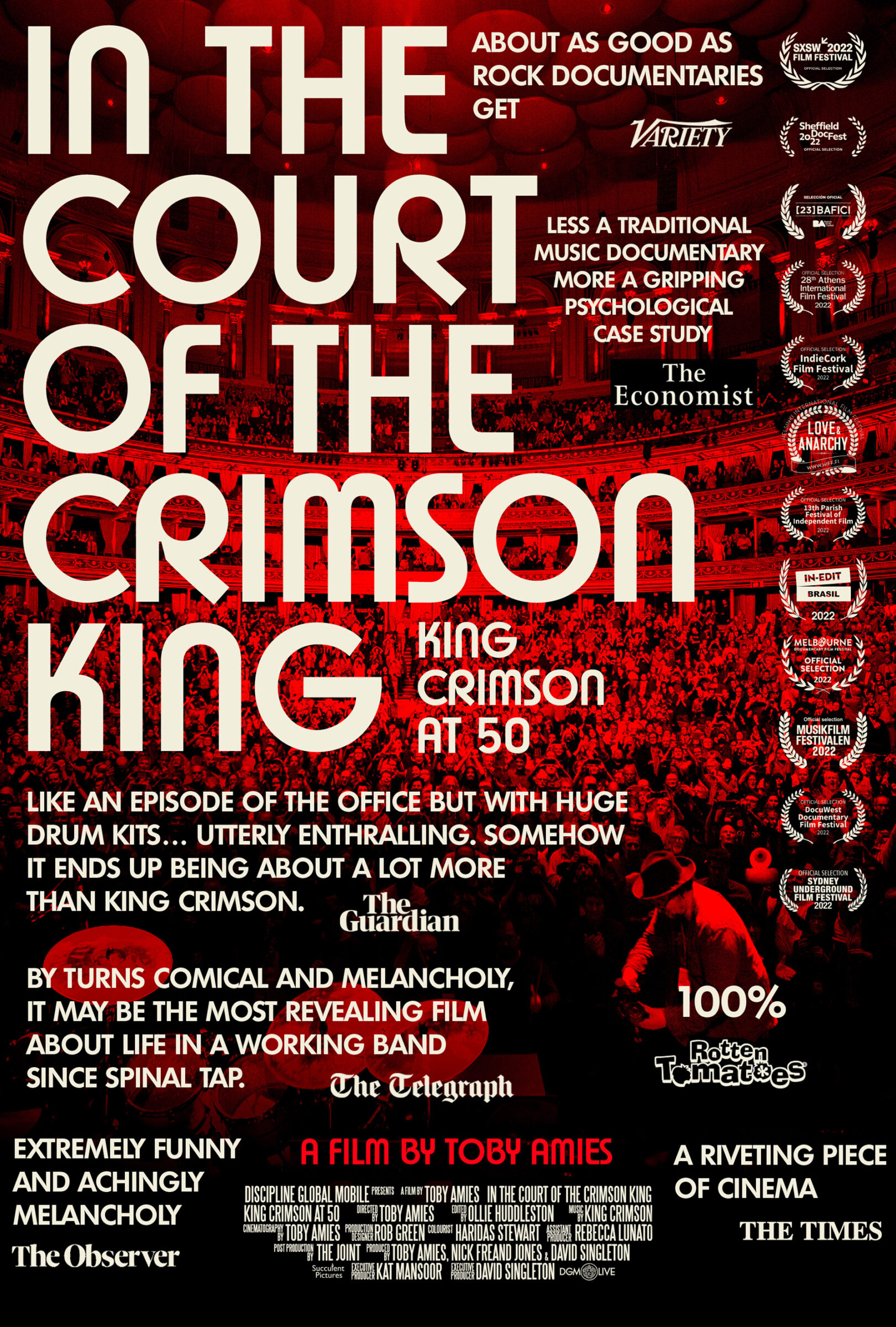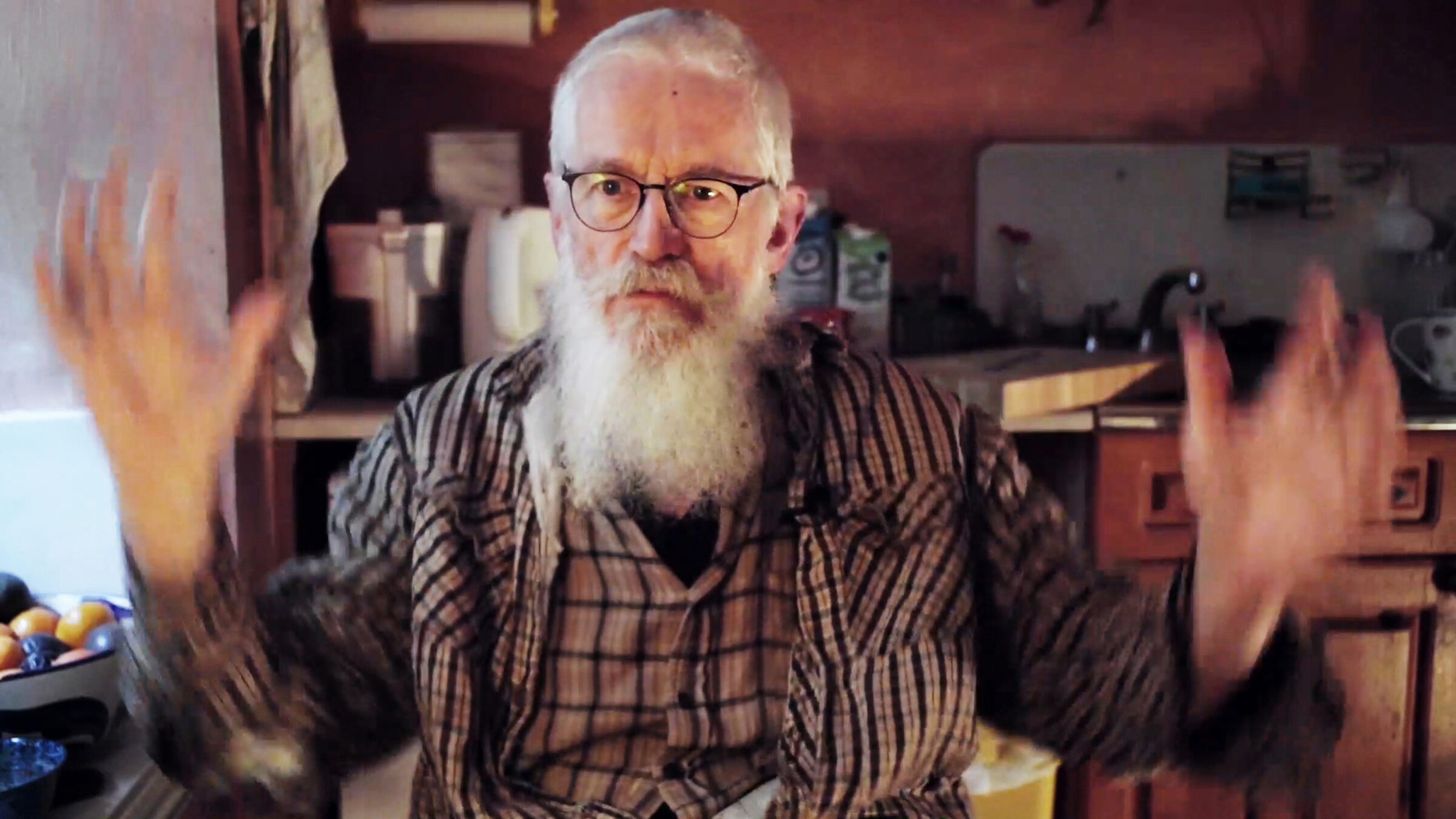(DISCIPLINE GLOBAL MOBILE (86 minutes; Unrated); 2023)

In the pantheon of so-called “progressive rock” groups, you’ll always find discussion of such bands as Yes, Genesis, ELP, Pink Floyd and a few other titans of technological trailblazing and trickery. Prog rock has generally been revered and reviled in equal percentages, but that’s no big deal… EVERYTHING is nowadays. Mention King Crimson, however, and I suspect there’ll often be a pause before the expected opinion is uttered. There’s always been something DIFFERENT, something hard to pin down about this Robert Fripp-led ensemble. You can’t just say ONE thing about them. Were they the makers of that outstanding classic rock platter IN THE COURT OF THE CRIMSON KING, the one with the cover of an enlarged mouth gone wild and the immensely pleasing vocals by Greg Lake? The unpredictable sonic architects of challenging platters like RED? The laboratory where some of today’s finest musicians, such as Bill Bruford, Tony Levin (looking cool as heck in his segments) and Adrian Belew went IN and came OUT as changed players forever? The often tyrannical experiment waged by mad overseer Robert Fripp who expected DISCIPLINE (pun intended), tireless dedication and an impossible sort of perfection from anyone he deemed worthy enough to be part of his ongoing alchemical adventure? The answer: YES. To all of that. And as the amazing documentary IN THE COURT OF THE CRIMSON KING: KING CRIMSON AT 50 makes clear, there was a lot of suffering taking place to make that art over a half-century’s duration..
“I came back from making some of that music and my hair had fallen out,” said guitarist extraordinaire Adrian Belew, whom most associate with one of the most fertile and memorable phases of the band, from 1981 to 2009. “It was so stressful to be under the microscope that way.”
“It could be a very bumpy… and lumpy ride,” Bill Bruford offered about his time in the band. “Some people handle being winded, and WOUNDED, better than others.”
Guitarist/vocalist Trey Gunn, part of the band from 1994-2003, provides an even more memorable quote about the KC experience. He compared being in Crimson to having a low-grade infection. “You’re not really sick, but you don’t feel well, either.”

Much has been written about King Crimson over the course of their volatile journey, and this documentary does a good job of trying to provide perspective on a fascinating musical story. A common element in any attempt to discuss the band is coming to terms with the uncompromising vision of guitarist/leader Fripp, who, as one of the most innovative guitarists of all time, had the right to pursue his musical goals and listen to what his ego commanded. But that was not always pleasant for the players, to say the least, and Fripp himself has often said he’s not always the nicest guy in pursuit of his musical ambition. Some contributors, such as percussionist Jamie Muir, didn’t last long; his work was mostly confined to the 1973 album LARKS’ TONGUES IN ASPIC.
“It’s a maelstrom of electricity,” he said in a clip from the film. “You’re in the middle of a storm, and you’ve got to stand in the middle of this storm and coherently play music. And a roaring, bellowing, regal animal tries to emerge out of something.”

There are plenty of clips of performances in the doc, although maybe not as many as you might want from the early days. But it’s the honest interviews with the many fabled musicians that make the biggest impression. Some, such as drummer Bill Rieflin, are not around anymore despite a prominent presence in the movie (Rieflin died in 2020 at the age of 59). There are quite a few segments that feature Rieflin, and he’s one of the more affable commentators we see. “Urgency is one of the main characteristics of Crimson music,” he relates. We see that powerful vibe in clip after clip, and Rieflin is among those who apparently thought the relentless challenge of it all was worth it, despite the “constant pain” he was in during his last couple of years. Rieflin was quite a storied musician already, having contributed his talents to bands such as Ministry, Pigface, REM and Swans among others. He was passionate about what Crimson was doing and said he was “made for it” when asked why he stayed when it was clearly so tough. “Music can restore grace, if only for a moment, in a person’s life,” the drummer related. He could have been referring to both the players and the fans. The doc shows us numerous crowd scenes of Crimson fans, clearly enraptured, bobbing their heads or staring at the band in awe. There’s a substantial segment featuring a nun, of all people, expressing her rabid enthusiasm for the band. “It goes over most peoples’ heads,” one pundit declares. “It is quasi scientific. If you get it, you really get it. Something like magic happens. But the conditions have to be so perfect. To get there… it’s so fragile.”

The film does not shy away from showing how bull-headed Robert Fripp often was. He was often quick to get angry, dismissive of early incarnations of the band, and actually somewhat insulting to director Toby Amies. A long and painful moment near the end of the doc shows the director waiting eternally for Fripp to answer a reasonable question. I had to check my screen a couple of times to make sure the image hadn’t frozen… but no, it was just a long, long closeup of Fripp thinking, composing some sort of response. And one of the last scenes is a direct insult, with Fripp obviously NOT quite appreciating the inherent uncertainty of what Amies was trying to do… putting together a sprawling and ambitious doc about one of the most singular and unpredictable bands in the history of rock music. Amies makes a wise decision to feature so many players in KC’s revolving door talking about their experiences… a sense of the genuinely personal and honest comes through, from pride to abject misery at times. “I just started to hate what I was hearing,” admits Ian McDonald, a KC member only in their first incarnation. “The really dark things. I hated inflicting it on the audience.”

But as the passing of time (and the countless changes) have shown, King Crimson has a dedicated fan base, who LIKE the “dark things” and the less easily accessible elements of this wild and weird music. Fripp always has an intense look on his face in the doc, like he KNOWS that attaining musical transcendence is possible, no matter the hardships for the rest of the band (and, to be fair, HIMSELF) in trying to get there. KING CRIMSON AT 50 serves the fan base well and does a remarkably balanced job at portraying the tireless pursuit of aiming for the sonic UNKNOWN by a truly ambitious innovator and his band of (mostly) sympathetic comrades. Whatever your opinion of any phase of Crimson’s long career, this well-paced documentary is absolutely worth seeking out.
(EDITOR’S NOTE: As an aside for readers in the Saint Louis area, if you miss Crimson’s “live actions” or just want to see a really good band playing some very challenging music, there is a great tribute band called THRAK performing locally for your listening and dancing pleasure. Check out their Facebook page when you need to scratch that Crimson itch.)
